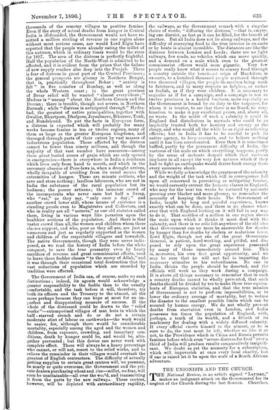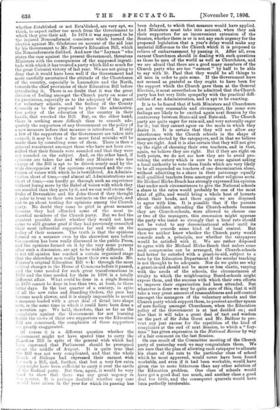THE UNIONISTS AND THE CHURCH.
THE National Review, in an article signed "Layman," makes an indignant attack on the Government for its neglect of the Church during the last Session. Churches, whether Established or not Established, are very apt, we think, to expect rather too much from the Government to which they give their aid. In 1874 it was supposed to be the injured Nonconformist conscience which turned the election against Mr. Gladstone on account of the aid, lent by his Government to Mr. Forster's Education Bill, which the Nonconformists disliked. And now the" Layman" who states the case against the present Government, threatens Ministers with the consequences of the supposed ingrati- tude with which it has treated a party which did so much for the great Unionist victory of last year. We are not going to deny that it would have been well if the Government had more carefully ascertained the attitude of the Churchmen of the country, especially in Lancashire and the North, towards the chief provisions of their Education Bill before introducing it. There is no doubt that it was the great division of feeling amongst the Church party on some of its provisions, especially as to the adequacy of the grant for voluntary schools, and the feeling of the County Councils as to the proposal to place the administra- tive policy of the education of the country in their hands, that wrecked the Bill. But, on the other hand, there is nothing more difficult than to consult ade- quately the supporters of any Government on the policy of a new measure before that measure is introduced. If only a few of the supporters of the Government are taken into council, it may be that a far more fatal mistake will be made than by consulting none of them. There is then a general resentment amongst those who have not been con- sulted that their friends were sounded and that they were not sounded on the subject. And, on the other hand, if opinions are taken far and wide any Minister who has charge of the Bill is apt to be driven nearly mad by the w:de divergencies of the opinions expressed and the con- fusion of voices with which he is bewildered. An Adminis- tration short of time,—and almost all Administrations are short of time,—can hardly go through such an experience without losing more by the Babel of voices with which they are assailed than they gain by it, and we can well excuse the Duke of Devonshire and Sir John Gorst if they thought it safer to trust to their own instincts on the subject, and not to go about touting for opinions among the Church party. No doubt they came to grief in great measure because they had offended some of the most in- tluential members of the Church party. But we feel the greatest possible doubt whether they would not have come to still greater grief if they had previously consulted their most influential supporters far and wide on the policy of their measure. The truth is that the opinions formed on a measure even by the shrewdest men before the question has been really discussed in the public Press, and the opinions formed on it by the very same persons after such a discussion, are apt to be widely different. It is not till opinion has reached a certain organised stage that the shrewdest men really know their own minds. Mr. Forster's original Education Bill wci t through the most critical changes in the House of Commons before it passed, and the time needed for such great transformations in 1870 and the time needed for them in 1896 is a totally different affair. What could be done in a single Session in 1870 cannot be done in less than two, at least, in these latter days. In the last quarter of a century, in spite of all the new rules and Standing Orders, the pace has become much slower, and it is simply impossible to mould a measure loaded with a great deal of detail into shape now, in the same time in which it could have been done a :4.2neration ago. We hold, therefore, that so far as the complaints against the Government for not learning better the views of their own supporters on the Education Bill are concerned, the complaints of these supporters are greatly exaggerated.
Of course it is a different question whether the Government might not have spared time to carry the ilznelices Bill in spite of the general wish which had been expressed that Parliament should be prorogued about the middle of August. It is quite true that tile Bill was not very complicated, and that the whole 1:ouch of Bishops had expressed their earnest wish 1,,r such a Bill, and, further, that but a very few extra might have been sufficient to carry it over the cavils L the Radical party. But then, again, it would be very hard to show that there was any great urgency in 1.e natter. It is perhaps doubtful whether any case w2uld have arisen in the year for which its passing has been delayed, to which that measure would have applied. And Ministers must take into account, when they ask their supporters for an inconvenient extension of the Session, whether there is or is not any such urgency for the proposed legislation that a year's delay would make any material difference to the Church which it is proposed to relieve of embarrassment by passing it. After all, even earnest Churchmen should in dealing with such questions as these be men of the world as well as Churchmen, and we are afraid that there are a good many members of the Church party who are too " earnest " by half to be able to say with St. Paul that they would be all things to all men in order to gain some. If the Government have not seemed as grateful as they ought to have been for the support which the Church gave them at the General Election, it must nevertheless be admitted that the Church party has but very little sympathy with the practical diffi- culties of an Administration, and is apt to be exacting.
It is to be feared that if both Ministers and Churchmen are not very reasonable and circumspect, the same sore feelings are likely to be excited again next Session by the controversy between State-aid and Rate-aid. The Church party are quite eager for rate-aid, and very naturally eager for it ; but they cannot agree on the mode in which they desire it. It is certain that they will not allow any interference with the Church schools in the shape of managers elected by the ratepayers, and in that we believe they are right. And it is also certain that they will not give up the right of choosing their own teachers, and in that, again, we believe they are right. But if they are right on both points, we do not see how they are to avoid pro- voking the outcry which is sure to arise against asking a local authority to vote them funds which are very likely to be all expended on teachers of one denomination alone, without admitting to a share in their patronage equally well qualified teachers from amongst other religious sects. Sir Michael Hicks-Beach has strongly expressed his opinion that under such circumstances to give the National schools a share in the rates would probably be one of the most fatal of gifts, and would bring a whole host of hornets about their heads, and there again we are disposed to agree with him. It is possible that if the parents of the children attending the Church-schools because they are Church-schools, were allowed to choose one or two of the managers, this concession might appease the party who insist so strongly that a local rate should not be voted to any denominational school until its managers concede some kind of local control. But then we neither know whether the Church party would concede such a principle, nor whether the ratepayers would be satisfied with it. We are rather disposed to agree with Sir Michael Hicks-Beach that unless some such compromise can be arranged, the Church-schools had better be satisfied with a grant-in-aid, subject to a veto by the Education Department if the secular teaching is not thought to be adequate. Nor do we quite see why a grant-in-aid should not be more or less elastic, varying with the needs of the schools, the circumstances of rivalry to which the neighbouring Board-schools might expose them, and the success with which their own efforts to improve their organisation had been attended. But whatever is done we may be quite sure of this, that it will take a very great amount of reasonableness and self-control amongst the managers of the voluntary schools and the Church party which support them, to prevent another spasm of sore feeling amongst Churchmen, when the Education policy of the Government is at last decided on ; and also that it will take a great deal of tact and wisdom on the part of Sir John Gorst and Mr. Balfour to pre- vent any just excuse for the repetition of the kind of complaints at the end of next Session, to which a " Lay- man " has given expression in the National Review by way of a fair comment on the last Session.
On one result of the Committee meeting of the Church party of yesterday week we may congratulate them. We are sure that the plan of allowing each ratepayer to allocate his share of the rate to the particular class of school which he most approved, would never have been found workable, and even if it bad been workable, would have given rise to more bitterness than any other solution of the Education problem. One class of schools would have got a good deal too much, and another class a good deal too little, and the consequent quarrels would have been perfectly intolerable.



















































 Previous page
Previous page